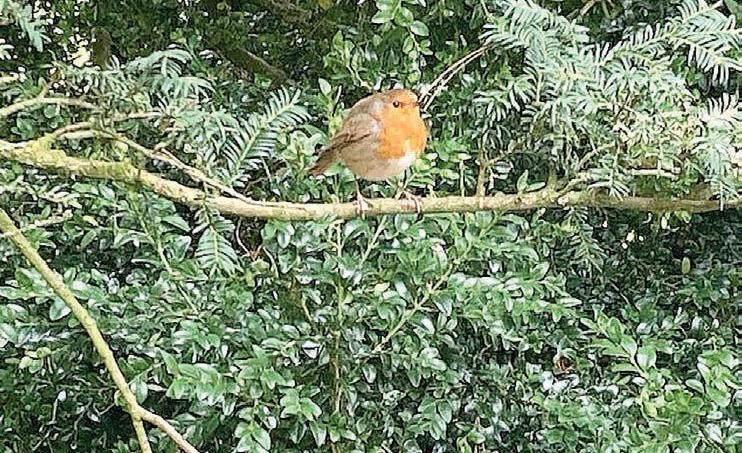
4 minute read
Outdoors Les Davies MBE
West Countryman’s diary
JANUARYand the start of a New Year. I am glad that I make no resolutions for the coming year. None of us knows what it holds, but can only hope we have some respite from this constantly mutating virus that affects every part of our lives. We will end up living with it I’m sure and in doing so will become used to the steps we have to take to protect ourselves and those around us. January is named after the Roman God Janus, who is portrayed as a twoheaded figure.
One looks to the future and the other retrospectively. That’s what a lot of us will be doing on New Year’s Eve and many will being seeing in the new and letting out the old, in whatever way suits them.
I am not a New Year person, but I do not deny the joy that others may have in its celebration. I work on the basis that it’s going to come along anyway, whether I am there to see it in or not. So that’s enough misery and “Bah Humbug” stuff. I am certainly hoping the next year will bring joy and happiness!
Out in the countryside nothing much will change in the field, hedgerow or wood. Those that live there will still continue the battle for survival and think about their preparation for spring and the start of a real New Year.
There is still a lot of talk concerning global warming and its effect on us. Taking down my copy of Edith Holden’s book, The Country Diary Of An Edwardian Lady, I find she makes comment of picking daisies and seeing a yew tree in blossom on the 29th of the month 1903.
Primroses are also mentioned as being in flower. “Ploughing, hedging and ditching are going on everywhere,” she wrote, “This has been a wonderfully mild January.”
Januarys haven’t always been so mild. Back in Anglo-Saxons times, more than a thousand years back, winters weren’t quite so kind. The ground would often be frozen and little work could be done on the land. Most livestock would have been slaughtered because there was insufficient food to feed them.
In a pagan world of superstition and uncertainty anything that made the gods look upon you with favour was seen to be a good thing. This is where the Wassail ceremony that we know today comes in. More associated with apple orchards than anything else, it was a pagan insurance policy to ensure a good crop. The words Waes-Hale literally mean Health be unto you in Anglo-Saxon.
As ever these old ceremonies are becoming more and more popular. I am doing the Master of Ceremony duties at seven events this year. Such a ceremony had another reason and that was to bring a little cheer into a cold, dark winter world. This was very much in line with the old pagan winter feast where the roots of Christmas became embedded.
It is also interesting to find that our tradition of singing Christmas Carols has its origins in House Wassailing, a blessing of the domestic residence from the same era. Perhaps we should be asking the question of not: “What did the Romans do for us” but “What did the Anglo-Saxons do for us?”
Parties and drinking possibly? There is bound to be a local celebration near to you, so go along and grab a bit of seasonal cheer, (unless we are all locked down by then)!
I’m going to leave you with some thoughts for a New Year from a real household name, Patience Strong. Born and christened Winifred Emma May in 1907, her rise to fame began in 1935 when she approached the editor of the Daily Mirror newspaper about publishing a regular series of her poems.
The editor asked her to come back again with 18 poems and a pseudonym . . . and so it all began. Her thoughts and poems were published in the Daily
With LES DAVIES MBE
Mirror’s “quiet corner” throughout the war years. By 1946 she was appearing in what was then the Sunday Pictorial, soon to become the Sunday Mirror.
Other publications to print her works were Woman’s Own magazine and a quarterly publication called This England. I have some old copies of This England from the 1970s, which seemed to portray a view of the British countryside that was 50 years out of date!
All flat hats, horses and pitchforks. Any way enough of my view! Here’s one of her poems that seems somewhat relevant at the moment, with our own troubled times.
A Year Is Born
We wish each other happiness as ever New Year chimes. We want it for ourselves, good days and happy times –but do we make too much of it and is there too much stress – laid on the importance of this thing called happiness?
A happy and a bright New Year; the customary phrase! Happiness is sweet . . . but in these grim and troubled days –may it be a useful year, a year of work well done; a busy year of goals attained and moral battles won.
It’s a strange and holy moment when from the belfry towers – the clocks strike out the solemn message of the midnight hours. A year is born . . . O pray for wisdom as it comes to birth – to do your share and build God’s kingdom here upon the earth. l Finally I have included a picture of our well know robin. In the Wassail ceremony he is said to represent the good spirits and it is he who the cider soaked toast hung in the apple tree is said to placate.












